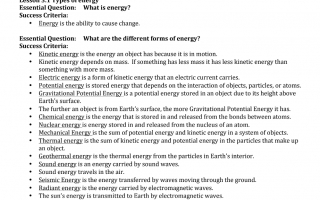مراجعة وتلخيص علوم منهج انجليزي الوحدة الثالثة صف سادس : نقدم اليكم في هذا الملف تلخيصا شاملا للوحدة الثالثة ، من منهج العلوم الصف السادس ،و قد تم تصميم هذا الملف لمساعدة طلابنا الاعزاء، في دراستهم و تحضيرهم للامتحان النهائي بشكل متكامل
Grade 6 Science Summary
AY 2017-2018 - Term 1
Chapter 3
The Big Idea : How does energy cause change
Lesson 3.1 Types of energy Essential Question: What is energy? Success Criteria
Energy is the ability to cause change
Essential Question: What are the different forms of energy ? Success Criteria
Kinetic energy is the energy an object has because it is in motion
Kinetic energy depends on mass. If something has less mass it has less kinetic energy than
something with more mass. Electric energy is a form of kinetic energy that an electric current carries. Potential energy is stored energy that depends on the interaction of objects, particles, or atoms. Gravitational Potential Energy is a potential energy stored in an object due to its height above Earth's surface. The further an object is from Earth's surface, the more Gravitational Potential Energy it has. Chemical energy is the energy that is stored in and released from the bonds between atoms. Nuclear energy is energy stored in and released from the nucleus of an atom
Mechanical Energy is the sum of potential energy and kinetic energy in a system of objects
Thermal energy is the sum of kinetic energy and potential energy in the particles that make up an object
Geothermal energy is the thermal energy from the particles in Earth's interior
Sound energy is an energy carried by sound waves
Sound energy travels in the air
Seismic Energy is the energy transferred by waves moving through the ground
Radiant energy is the energy carried by electromagnetic waves
The sun's energy is transmitted to Earth by electromagnetic waves
Essential Question : How is energy used
Success Criteria
Energy is used to move cars, heat homes, produce light, move muscles, catch prey, and cook food
Lesson 3.2 Energy Transformations and Work
Essential Question : What is the law of conservation of energy? Success Criteria
Energy transformation is the conversion of one form of energy to another
The Law of Conservation of Energy says that energy cannot be created or destroyed; it can be transformed from one form to another
Essential Question : In what ways can energy be transformed ? Success Criteria
Energy is transformed from one kind into another
Energy is also transferred when it moves from one object to another
EXAMPLES
The electric energy in the wiring of a heat lamp is transformed into thermal energy
When the blades of wind turbines rotate they turn a generator that changes the kinetic energy of the moving blades into electric energy.l
Hydroelectric energy plants convert the gravitational potential energy of water into electric energy
Burning fossil fuels breaks the bonds of its atoms apart changing chemical energy into thermal energy
Essential Question : How are energy and work related? Success Criteria
Work is the transfer of energy that occurs when a force makes an object move in the direction of the force while the force acts on the object
Work depends on the amount of force applied to an object
Work also depends on the distance the object moves
CALCULATING WORK work ( in joules ) = force (in newtons ) X distance (in meters ) W=Fd
Doing work on an object transfers energy to the object
Lesson 3.3 Machines
Essential Question : What are simple machines? Success Criteria
Simple machines are machines that do work using one movement
Simple machines do not change the amount of work required to do a task, they only change the way work is done. EXAMPLES OF SIMPLE MACHINES o An inclined plane is a flat, sloped surface
A screw is an inclined plane wrapped around a cylinder
A wedge is an inclined plane that moves A lever is a simple machine that pivots around a fixed point
A wheel and axle is a shaft attached to a wheel of a larger diameter so that both rotate together
A pulley is a grooved wheel with a rope or cable wrapped around it. A complex machine is two or more simple machines working together. Efficiency is the ratio of output work to input work. Efficiency is the measure of how much work put into the machine is changed into useful output work EFFECIENCY EQUATION output work in Wout efficency (in %) =* 100% = " x 100% input work in
Essential Question : In what ways can machines make work easier. Success Criteria
Machines make work easier by changing the size of the force required, the distance over which the object moves, or the direction of the input and output forces





